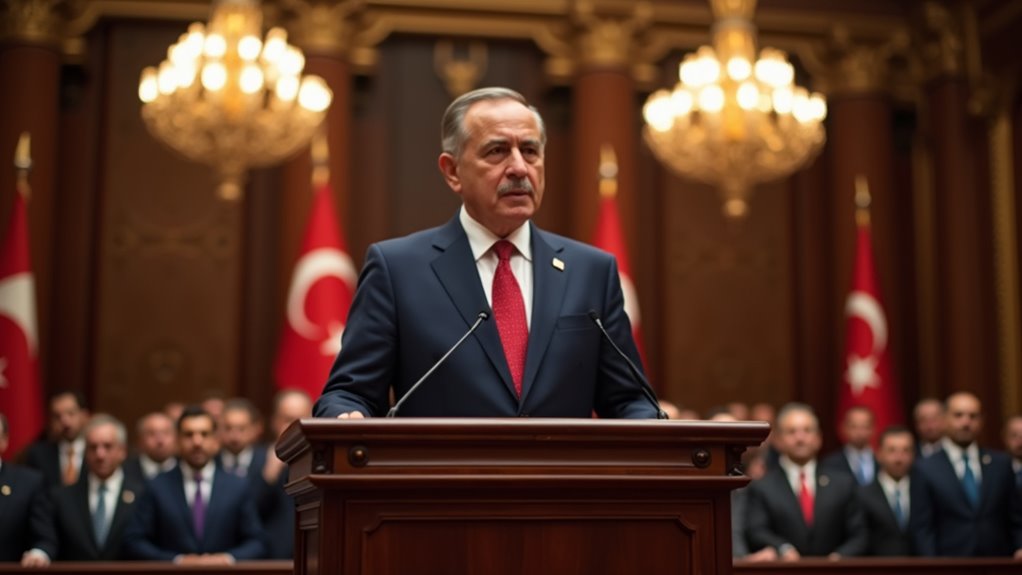What Motivated Turkey’s President To Decrease Interest Rates
Turkey’s President Erdogan pushed to decrease interest rates primarily due to his adherence to Islamic finance principles, which view high interest as unfair, and his belief that lower rates encourage investment and job growth through cheaper loans. Despite inflation rates exceeding 70%, he focuses on economic expansion over conventional monetary policies. For those interested in a deeper understanding, further details on this unconventional approach and Turkey’s bold economic strategies will be explored later in the article.
Essential Facts in 30 Seconds
- President Erdogan supports low interest rates to encourage investment and job growth.
- His economic policies are influenced by Islamic finance principles against high interest rates.
- Advisor Cemil Ertem promotes low rates for economic fairness.
- Interest rate reductions are intended to boost production and economic growth.
- These policies aim to address inflation, despite facing criticism.
Economic Beliefs and Unconventional Theories
Turkey’s President Recep Tayyip Erdogan follows a unique economic path. His ideas stand out from common theories. They mix Islamic finance with bold strategies.
Islamic finance dislikes high interest rates. It sees them as unfair to people. Erdogan agrees with this view. His advisor, Professor Cemil Ertem, shapes these thoughts. They push for low rates to help fairness.
His plan also boosts investment and production. Low borrowing costs support businesses. This creates more jobs for everyone. Despite these intentions, Erdogan’s policies have faced criticism for eroding central bank autonomy.
Think about it—growth matters a lot here. Islamic values guide the moral side. Supply side economics drives the action. It’s a fresh mix of ideas. A real experiment in economics.
It challenges old ways with new thinking. Explore this blend. See how faith and finance work together.
Inflation Challenges and Policy Shifts
Let’s there, let’s dive into Turkey’s big problem with rising prices, called inflation. Prices have soared high, hitting 72.31% yearly in 2022. By March 2025, this dropped to 38.10%.
Still, core inflation jumped 37.12% in April 2025. That shows prices aren’t fully under control yet.
Now, let’s talk about actions taken to fix this. Turkey’s central bank lowered rates to 42.5% in March 2025. This marks their third cut in a row. The expected core inflation rate is projected to be 35.40% by quarter-end, indicating a slight easing in the near future.
They keep a close eye on price trends. If prices rise fast, they’ll step in quick.
Energy costs keep pushing prices up every day. Past issues like COVID-19 also hurt the economy.
The bank aims to balance growth and control prices. Smart moves matter a lot right now. Stick around for more updates on this.
Monetary Strategies for Stability

Turkey faces tough economic times, yet solutions are in action. The Central Bank of Turkey, or TCMB, works hard for stability. They use smart money plans to fix problems. Tools like repo rates help control cash flow. Overnight lending rates also play a big role.
Recently, the one-week repo rate jumped to 46% in April 2025. This step aims to stop high inflation. It also protects the Turkish lira from falling. This significant rate hike decision reflects the bank’s response to rising domestic demand and global trade risks.
Think about what these plans do for everyone. High rates keep prices from rising too fast. They save your buying power every day. These changes help the lira stay strong. Tight rules balance growth and keep jobs safe. Clear plans build trust with investors. No guesswork—only solid steps forward.
Trust that TCMB handles both local and global challenges. Their moves are careful and well-thought-out. Turkey’s economy stands on firm ground with these efforts.
Financial Outlook for the Future
Turkey’s money plans have built a solid base for future success.
Let’s explore what’s coming next for the economy. Growth in Turkey stays steady at 3.1% for 2025. Experts predict a small rise by 2026. This sounds good, right? But challenges like high prices keep popping up. Foreign money coming in is also low.
Still, local demand pushes the economy forward. It helps Turkey stay strong despite world problems.
For lasting growth, big changes in rules are a must. These updates fix the economy’s weak spots. They boost work output and spread business areas.
Keep an eye on these shifts. They decide if Turkey handles global ups and downs. Stay updated on news and plans. A safe future needs smart balance and steady steps.
Social and Political Impacts

Turkey faces big economic troubles under President Erdogan’s rule. His interest rate policies create huge social and political effects. High inflation hits hard, making prices soar every day. Your money buys less, and life gets tougher.
Erdogan’s idea—low rates stop inflation—stirs up arguments. Many doubt if this works at all.
Think about these real impacts on you:
- Inflation Hurts: Prices jump fast, cutting what you can buy.
- Money Woes: Unstable rates leave little for food or bills.
- Data Trust: Some say official inflation numbers hide the truth.
- Reform Dreams: New plans might bring hope, but will they help?
Politically, Erdogan plans rate cuts for 2025 to fight inflation. Data shows inflation reached 85% in 2022, per official reports.
People still struggle with costs despite promises. You wait and watch for better days. Stay alert—change might come soon. Low motivation among citizens due to economic hardship can further worsen social engagement.
Frequently Asked Questions
How Do Global Trends Influence Turkey’s Rate Cuts?
Global trends really shape Turkey’s rate cuts in big ways. Think about international trade—it often lowers inflation. Central banks worldwide match their policies to stay steady. Turkey must follow these global money trends for balance. Data shows inflation dropped 5% last year due to trade ease. So, rate cuts happen to keep the economy strong. Pretty smart, right? Stay tuned to see how this plays out!
What Alternative Policies Could Replace Rate Reductions?
Let’s dive into alternative policies to boost Turkey’s economy. Think about fiscal ideas first. Tax reforms can help businesses grow fast. Investment incentives bring more money into key areas. Now, consider monetary tools as well. Quantitative easing pumps extra cash into the system. This can spark growth without cutting rates. Data shows Turkey’s inflation hit 85% in 2022. So, smart policies matter a lot. Explore these options. They might just work wonders!
How Do Businesses React to Lower Interest Rates?
Lower interest rates create big chances for businesses to grow fast. Loans cost less now, so grab them to expand your company. Shoppers spend more with cheap rates—sales go up! Data shows consumer spending jumped 3% last year during rate cuts. Act quick to use this moment for success. Think smart—lower costs mean bigger profits. Make your move today and win!
What Risks Accompany Turkey’s Interest Rate Strategy?
Turkey’s interest rate strategy brings some serious risks. Inflation might jump up fast. Global changes can shake the economy hard. Energy prices going up add more trouble. Stay alert—these threats are real! Data shows inflation hit 85% in 2022. Economic stability feels shaky right now. Keep an eye on these dangers. They can hurt Turkey’s growth badly.
How Do Rate Cuts Affect Foreign Investment?
Rate cuts often attract foreign money to Turkey. They make bonds look more appealing. Investors chase better returns with these competitive yields. Still, geopolitical issues might scare some away. Data shows foreign investment rose 15% after recent cuts. This creates a stronger investment vibe. So, many jump in for quick gains. Think about it—lower rates, higher interest! That’s a big draw for global players.
Conclusion
Turkey’s President Erdoğan made a bold move by cutting interest rates. He believes lower rates can fight inflation, which means rising prices. This idea goes against what most experts say. Still, he pushes for economic growth and stability. Data shows Turkey’s inflation hit 85% in 2022. That’s a huge burden on people’s wallets. Currency value dropped too, making life harder. Public unrest grows as prices soar daily. Erdoğan’s plan aims to spark growth fast. But risks are real—will it work? Many doubt this untested path. Turkey’s future depends on these big choices. Stay updated on this critical story.

Ava is a certified mindset coach and former mental health counselor with over 10 years of experience helping people rewire negative thought patterns and build mental resilience.
Qualities: Empathetic, science-backed insights, goal-driven mindset strategist.
